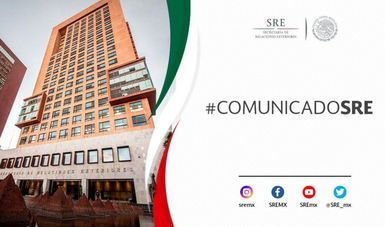Continuing Mexico's gradual participation in UN Peace Operations, the Mexican government contributed the following military personnel to the Peace Operations in Haiti, Western Sahara, the Central African Republic and Colombia in 2017:
- United Nations Stabilization Mission in Haiti (MINUSTAH)
Based on the gradual withdrawal of MINUSTAH military personnel and the end of the mission on October 15, 2017, Mexican military elements participated in the mission as follows:
- Two SEDENA and one SEMAR official joined Chile's national contingent in the mission in December 2016 and ended their participation in April 2017.
- One SEDENA and one SEMAR officers ended their participation as Staff Officers at the mission's headquarters in May 2017.
- Another SEDENA official, also deployed to the mission’s headquarters since December 2016, ended his commission in October 2017.
In addition, on February 20, 2017, the National Security Commission and Federal Police sent a Mexican delegation composed of members of the Senate, SRE, SEDENA, SEMAR and SEGOB to a MINUSTAH meeting in Port-au-Prince, Haiti, to learn about how the mission operated and the work done by Mexican military personnel.
2. United Nations Mission for the Referendum in Western Sahara (MINURSO)
In coordination with the UN, Mexico contributed four military observers to MINURSO for a period of 12 months: three from SEDENA and one from SEMAR. In November 2017, the UN approved the participation of a SEDENA official as an observer in MINURSO for 12 months starting on January 12, 2018. This is the first time a Mexican woman has participated in a UN Peacekeeping Operation.
3. United Nations Multidimensional Integrated Stabilization Mission in the Central African Republic (MINUSCA)
Mexico sent a SEDENA official to serve in MINUSCA headquarters for 12 months starting on August 5, 2017 in order to continue strengthening its cooperation with the UN and to explore new options for participating in the peace operations in Africa.
4. United Nations Special Political Mission in Colombia (MPEC)
In 2017, the UN requested a six-month extension for nine of the 25 Mexican observers who joined MPEC in 2016, while two more observers were replaced after one year.The Mexican personnel continued participating until September 25, 2017, when the mission ended.
On September 26, 2017, the UN Security Council established a second Special Political Mission in Colombia, called the UN Verification Mission, to verify compliance with the next stage of the peace process there. At the UN's request, eight Mexican observers (seven from SEDENA and one from SEMAR), including three women (two from SEDENA and one from SEMAR), continued as part of the mission until between December 2017 and January 2018.
Other key activities in 2017 were the following:
From May 23-25, 2017, Mexico's National Security Commission and Federal Police took part in a UN Peacekeeping Operations Police Commanders' curriculum development workshop held in the UN Global Service Centre in Brindisi, Italy.
On July 6-8, 2017, Mexico took part in the Chiefs of Defense Conference at UN headquarters in New York.
In August 2017, Mexico announced to the UN its decision to gradually contribute police personnel to peace operations, particularly the UN Mission for Justice Support in Haiti (MINUJUSTH) established by the UN Security Council on October 16, 2017 to replace MINUSTAH.
On November 14-15, 2017, General Salvador Cienfuegos Zepeda, Defense Secretary, and Admiral Vidal Francisco Soberón Sanz, Secretary of the Navy, took part in the UN Peacekeeping Defense Ministerial Conference in Vancouver, Canada. At the meeting, representatives from 79 countries, including Mexico, reaffirmed their commitment to UN peacekeeping and discussed the importance of innovation in training and capacity building, as well as improving rapid deployment in peace operations.
Mexico also continued to expand its dialogue and cooperation with different countries regarding UN peace operations, especially as related to training and to finding ways to include Mexican personnel in their contingents in operations of interest to Mexico.
More than two years after having resumed its participation in peace operations, the results have been very positive for Mexico: there have been significant and tangible benefits for Mexico's Armed Forces in terms of experience acquired in defense, military observation, and planning military operations with high international standards. In addition, Mexican troops have participated in secure conditions and without incident.
Additionally, the Mexican government's decision to expand its participation by including the Federal Police in Peace Operations reaffirms its commitment to cooperating with and supporting the UN in this area.
